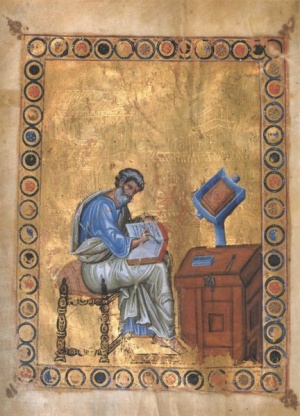Difference between revisions of "Apostle Matthew"
m |
m (fixed headers) |
||
| Line 1: | Line 1: | ||
[[image:Matthew.jpg|right|thumb|An image of St Matthew writing his Gospel from a 10th century manuscript]]The holy, glorious and all-laudable [[apostles|Apostle]] and [[Evangelist]] '''Matthew''' is traditionally believed to be the author of the [[Gospel of Matthew]]. The apostle's symbol is an angel. He is commemorated by the Church on [[November 16]]. | [[image:Matthew.jpg|right|thumb|An image of St Matthew writing his Gospel from a 10th century manuscript]]The holy, glorious and all-laudable [[apostles|Apostle]] and [[Evangelist]] '''Matthew''' is traditionally believed to be the author of the [[Gospel of Matthew]]. The apostle's symbol is an angel. He is commemorated by the Church on [[November 16]]. | ||
| − | =Life= | + | ==Life== |
Matthew was originally called Levi. He was the son of Alphaeus and was by profession a publican, or tax-collector, at Capernaum. On one occasion [[Jesus Christ|Jesus]], coming up from the side of the lake, passed the custom-house where Matthew was seated and said to him, "Follow me." Matthew arose and followed Christ, becoming his disciple (Matthew 9:9). He changed his name to reflect his new calling (Matthew means "Gift of the Lord"). | Matthew was originally called Levi. He was the son of Alphaeus and was by profession a publican, or tax-collector, at Capernaum. On one occasion [[Jesus Christ|Jesus]], coming up from the side of the lake, passed the custom-house where Matthew was seated and said to him, "Follow me." Matthew arose and followed Christ, becoming his disciple (Matthew 9:9). He changed his name to reflect his new calling (Matthew means "Gift of the Lord"). | ||
| Line 8: | Line 8: | ||
After the resurrection of our Lord, Matthew went and preached amongst the Jews. His Gospel was probably first written in Aramaic and later translated into Greek. Eventually Matthew went to Ethiopia to spread the [[gospel]]. There he was martyred by Fulvian, the ruler of the region, by being set on fire. After Matthew willingly gave up his soul to the Lord, his body was put in a coffin and cast into the sea. It washed up at the site of the church he had built. Fulvian, Matthew's persecutor, immediately repented of his deed, renounced his position of worldly power, and was made a presbyter by the Bishop Platon (or Plato). Once Platon died, the apostle appeared to the priest (who had taken the name Matthew as well) and told him to assume the bishop's throne. | After the resurrection of our Lord, Matthew went and preached amongst the Jews. His Gospel was probably first written in Aramaic and later translated into Greek. Eventually Matthew went to Ethiopia to spread the [[gospel]]. There he was martyred by Fulvian, the ruler of the region, by being set on fire. After Matthew willingly gave up his soul to the Lord, his body was put in a coffin and cast into the sea. It washed up at the site of the church he had built. Fulvian, Matthew's persecutor, immediately repented of his deed, renounced his position of worldly power, and was made a presbyter by the Bishop Platon (or Plato). Once Platon died, the apostle appeared to the priest (who had taken the name Matthew as well) and told him to assume the bishop's throne. | ||
| − | =Sources and | + | ==Sources and external links== |
*[[w:Matthew the Evangelist|Wikipedia's Matthew]] | *[[w:Matthew the Evangelist|Wikipedia's Matthew]] | ||
*[http://ocafs.oca.org/FeastSaintsViewer.asp?SID=4&ID=1&FSID=103313 OCA Hagiography] | *[http://ocafs.oca.org/FeastSaintsViewer.asp?SID=4&ID=1&FSID=103313 OCA Hagiography] | ||
Revision as of 02:02, August 18, 2006
Life
Matthew was originally called Levi. He was the son of Alphaeus and was by profession a publican, or tax-collector, at Capernaum. On one occasion Jesus, coming up from the side of the lake, passed the custom-house where Matthew was seated and said to him, "Follow me." Matthew arose and followed Christ, becoming his disciple (Matthew 9:9). He changed his name to reflect his new calling (Matthew means "Gift of the Lord").
The same day on which Jesus called him he made a "great feast" (Luke 5:29), a farewell feast, to which he invited Jesus and his disciples and probably also many of his old associates. The last notice of him in the New Testament is in Acts 1:13.
After the resurrection of our Lord, Matthew went and preached amongst the Jews. His Gospel was probably first written in Aramaic and later translated into Greek. Eventually Matthew went to Ethiopia to spread the gospel. There he was martyred by Fulvian, the ruler of the region, by being set on fire. After Matthew willingly gave up his soul to the Lord, his body was put in a coffin and cast into the sea. It washed up at the site of the church he had built. Fulvian, Matthew's persecutor, immediately repented of his deed, renounced his position of worldly power, and was made a presbyter by the Bishop Platon (or Plato). Once Platon died, the apostle appeared to the priest (who had taken the name Matthew as well) and told him to assume the bishop's throne.
Sources and external links
Categories > Church History
Categories > Church History
Categories > Church History
Categories > Liturgics > Feasts
Categories > Liturgics > Feasts
Categories > Liturgics > Feasts
Categories > People > Missionaries
Categories > People > Saints
Categories > People > Saints > Biblical Saints
Categories > People > Saints > Martyrs
